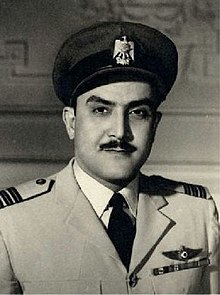Hassan Ibrahim (1917 – 1990) was an Egyptian Air Force officer and one of the founders of the Free Officers movement.
Hassan Ibrahim | |
|---|---|
 Portrait of Wing Commander Hassan Ibrahim (1952) | |
| Born | 1917 |
| Died | 1990 (aged 72–73) |
| Nationality | Egyptian |
| Alma mater | Egyptian Air Academy |
| Occupation | Military officer |
| Years active | 1940–1980s |
Early life and education edit
Ibrahim was born in Alexandria in 1917.[1][2] He graduated from the Egyptian Air Academy in 1927.[2][3]
Free Officers Movement edit
Ibrahim was among five military officers who formed the first cell of the Free Officers movement in July or September 1949.[4][5] Although it is argued that Ibrahim along with other officers was a member of the Muslim Brotherhood's special unit from 1944 to 1945,[4][5] there is another report stating that Ibrahim was part of the group called Young Egypt.[3] In addition, Ibrahim was one of the nine-member leadership group of the Free Officers movement.[1] The movement led the 1952 Revolution.[6] Then Ibrahim became a member of the 14-member Revolution Command Council that was charged with the running of Egypt following the success of the revolution.[1]
Career edit
Ibrahim participated in the Palestinian war in 1948.[2] In 1952 he served as an Air Force group captain.[1] In 1954 he led the group who expelled President Mohamed Naguib from Abdeen Palace.[1] He was one of the three judges, who tried the members of the Muslim Brotherhood after their attempted assassination attack against President Gamal Abdel Nasser in 1954.[7] The other judges were Anwar Sadat and Abdel Latif Boghdadi.[7]
Ibrahim was also appointed minister for presidential affairs in 1954.[3] Two years later, in 1956, he was named the head of the Egyptian economy agency.[3] After dealing with business for a while, in February 1964, he was appointed as one of seven vice deputies of President Nasser.[3] Ibrahim joined the Arab Socialist Union in 1962 when the party was established and was one of the sub-secretaries for its finance and commerce department.[8] The other sub-secretary of the department was Abdul Munim Qaysuni, an economist.[8] Ibrahim's tenure as vice deputy ended in 1966 when Nasser asked him to end his extramarital relationship, and Ibrahim continued business activities.[3]
Later years and death edit
In 1975, Ibrahim gave a series of interviews to Egyptian author Sami Gohar which were published as a book titled The Silents Speak: Abdelnasser and the Massacre of the Muslim Brotherhood.[2] In the book Ibrahim harshly criticized Gamal Abdel Nasser.[2] He died in 1990.[1]
Honour edit
Foreign honour edit
- Malaysia:
- Honorary Grand Commander of the Order of the Defender of the Realm (SMN (K)) - Tun (1965)[9]
References edit
- ^ a b c d e f "All the revolution's men". Al Ahram Weekly. 595. 18–25 July 2002. Archived from the original on 18 October 2012.
- ^ a b c d e Zeinab El-Gundy; Karim Abdel Kodos (23 July 2015). "Meet the Free Officers of Egypt's Revolutionary Command Council". Ahram Online. Retrieved 7 July 2022.
- ^ a b c d e f Robin Bidwell (2012). Dictionary of Modern Arab History. London; New York: Routledge. p. 150. ISBN 978-1-136-16298-5.
- ^ a b Mohammed Zahid (2012). The Muslim Brotherhood and Egypt's Succession Crisis: The Politics of Liberalisation and Reform in the Middle East. London; New York: I.B.Tauris. p. 76. ISBN 978-1-78076-217-3.
- ^ a b Hazem Kandil (2012). Soldiers, Spies and Statesmen: Egypt's Road to Revolt. London and New York: Verso Books. p. 37. ISBN 978-1-84467-961-4.
- ^ "The Revolution and the Early Years of the New Government: 1952-56". Country Studies. Retrieved 31 January 2013.
- ^ a b Steven A. Cook (2011). The Struggle for Egypt: From Nasser to Tahrir Square. Oxford; New York: Oxford University Press. p. 59. ISBN 978-0-19-979532-1.
- ^ a b Patricia Peghini Ryan (1972). The Arab Socialist Union of Egypt (PhD thesis). West Virginia University. p. 95. ISBN 9798659245712. ProQuest 302593067.
- ^ "Senarai Penuh Penerima Darjah Kebesaran, Bintang dan Pingat Persekutuan Tahun 1965" (PDF). Archived from the original (PDF) on 28 September 2018. Retrieved 15 June 2016.